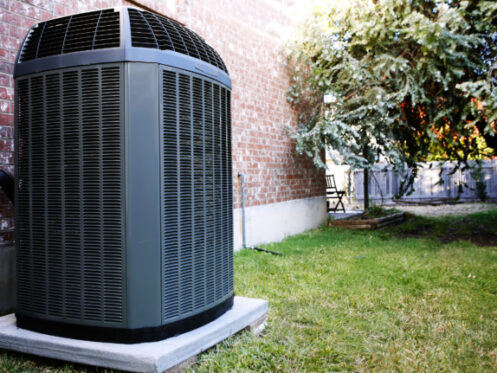All HVAC work more like cars. They require regular maintenance to maintain peak performance, but occasionally, they break down and need professional repair. Here are some of the problems you’ll likely encounter in your air conditioning unit and what you need to know about them.
1. Your AC Won’t Turn On
The first and most obvious problem you might encounter is attempting to turn on your AC only to find it doesn’t run. The culprit here is usually your thermostat. It may need new batteries, or the wiring could be faulty.
Another possibility is that there’s an electrical problem within the unit itself. Perhaps the wiring within your system has failed, the circuit breaker has tripped, or there is a blown fuse.
This issue may also arise when your AC motor is overheating, overloaded, or has seized up. This motor is responsible for converting alternating current into mechanical energy that turns the fan blades, making the AC cool or warm your home.
2. AC Not Cooling Properly
If your system powers on but fails to cool the air effectively, the issue might lie with the compressor. Low refrigerant levels, which are crucial for cooling the air, often cause this problem.
Your refrigerant level could be low because of leaks or an issue with the evaporator coil. Moreover, clogged air filters can reduce the airflow, making it challenging for your AC to lower the temperature efficiently.
3. AC Making Strange Noises
A well-functioning AC system has a noise level of about 50 to 60 dB. This is akin to a silent whisper or a quiet conversation. If your system exceeds this range, you might have a problem at hand.
Banging noises mean a broken or loose part inside your unit. Clanking sounds could be due to an unbalanced fan, and it is usually followed by metal hitting metal.
Hissing means the refrigerant is leaking out. Squealing noises indicate a worn-out belt that needs replacing while grinding noises suggest an issue with the motor bearings.
4. Bad Smell from AC
Any odor from your AC is unacceptable. It is a comfort system designed to improve indoor quality and provide a refreshing atmosphere, so a bad smell is far from ideal.
A musty or mildew odor could mean mold growth in your AC system. Mold occurs due to moisture in the system or a lack of proper cleaning.
A rotten smell indicates the presence of Sulfur gas in the air. Sulfur leaks from faulty gas appliances and can cause irritation to the eyes, nose, and throat and cancer after long-term exposure.
A burning or electrical smell could mean the insulation on the system’s wires is burning. You notice it when your motor is overheating, or your electrical components are failing.
5. AC Leaking Water
Water leaks for four reasons: a clogged condensate drain line, a frozen evaporator coil, a damaged condenser pump, or a low refrigerant level. Condensate drain line clogs because of dirt buildup over time. Frozen evaporator coils indicate a lack of proper airflow, possibly due to a dirty air filter or blocked vents.
The condenser pump experiences normal wear and tear and eventually fails. A low refrigerant level causes your AC to struggle to cool, leading to excessive condensation.
6. AC Short Cycling
Short cycling occurs when your AC unit turns on and off frequently without completing a full cooling cycle. This could be due to a faulty thermostat or inadequate refrigerant levels.
However, you can also experience this issue if you recently modified your home. When your AC installers were sizing your system, they considered the square footage of your home. If the size changes due to renovations, then you might experience short cycling.
7. Thermostat Malfunctioning
The thermostat is the brain of your system, so if it malfunctions, the entire AC unit will not work properly. You’ll notice symptoms such as inconsistent temperatures, inaccurate readings, and unresponsive buttons.
8. Constantly Running AC
Although your AC should run frequently, especially during hot weather, it should shut off from time to time to avoid freezing up. A system that runs constantly will wear out quickly and increase your energy bills.
The reason you have this issue could be due to dirty air filters, blocked vents or debris accumulation in the outdoor unit. Also, a faulty thermostat with sensor issues or incorrect settings could cause your AC to run constantly.
9. AC Tripping Circuit Breaker
A circuit breaker shuts down everything connected to it when there is an overload or short circuit. If your AC keeps tripping the circuit breaker, then there must be a problem with its electrical system. The cause could be a damaged compressor, faulty wiring, or dirty condenser coils.
Tips for Finding a Reliable AC Repair Service
Research and Reviews
When looking for a reliable AC repair service, start by researching local HVAC contractors. Look for companies with positive reviews and testimonials from satisfied customers. You can ask for recommendations from friends, family, or neighbors or visit online platforms like Yelp, Google, and the Better Business Bureau for reviews and ratings.
Certifications and Licenses
Always look for certified, licensed, insured, and bonded contractors to perform AC repairs. Certifications from organizations like NATE (North American Technician Excellence) indicate that the technicians have undergone rigorous training and testing, while EPA’s (Environmental Protection Agency) certification shows that they are qualified to handle refrigerants.
Insurance protects you from any damages or injuries that may occur during the repair process. A bond ensures compensation if the contractor fails to complete the job or causes any damages.
Experience and Expertise
You should look for a contractor who is well-versed in the unique needs and challenges of your AC system. They should have experience in handling different types, brands, and models of air conditioners. This will ensure quick and efficient repairs, saving you time and money.
Transparency and Communication
A reliable AC repair service should be transparent in their pricing, communication, and processes. They should provide detailed quotes outlining all costs involved in the repair process, and inform you of any additional charges before starting the work. They should also communicate with you throughout the process, keeping you updated on the progress and any potential issues that may arise.
Emergency Services
AC breakdowns can happen at any time, so it’s important to choose a repair service that offers emergency services. Some issues like gas leaks and faulty wiring can’t wait until the next business day.
How to Prepare for the Repair Service
Clear the Area
Before the technician arrives, clear the area around your AC unit to provide easy access. Remove any obstacles, such as furniture, plants, or debris, that could hinder the technician’s work. Also, unlock any gates or doors for easy entry.
Gather Information
Compile any relevant information about your AC unit, including the make and model, purchase date, and warranty details. Also document when you started noticing the issue at hand. This data will give your contractor a better understanding of the problem and help them provide a more accurate solution.
Ask Questions
Don’t be afraid to ask questions about the repair process, pricing, or any concerns you may have. A reputable AC repair service will be happy to address your inquiries and ensure that you feel comfortable with their services.
Call Kalins Indoor Comfort for Professional Repairs
If you live in Iowa, South Dakota, or Nebraska, call Kalins Indoor Comfort today for all the repair services that you need. We are available 24/7 for emergency issues, and our experienced technicians will provide prompt, reliable, and high-quality repairs for your AC system. Moreover, we do geothermal HVAC installation, aerosol duct sealing, indoor air quality services, and preventative maintenance of commercial HVAC.











